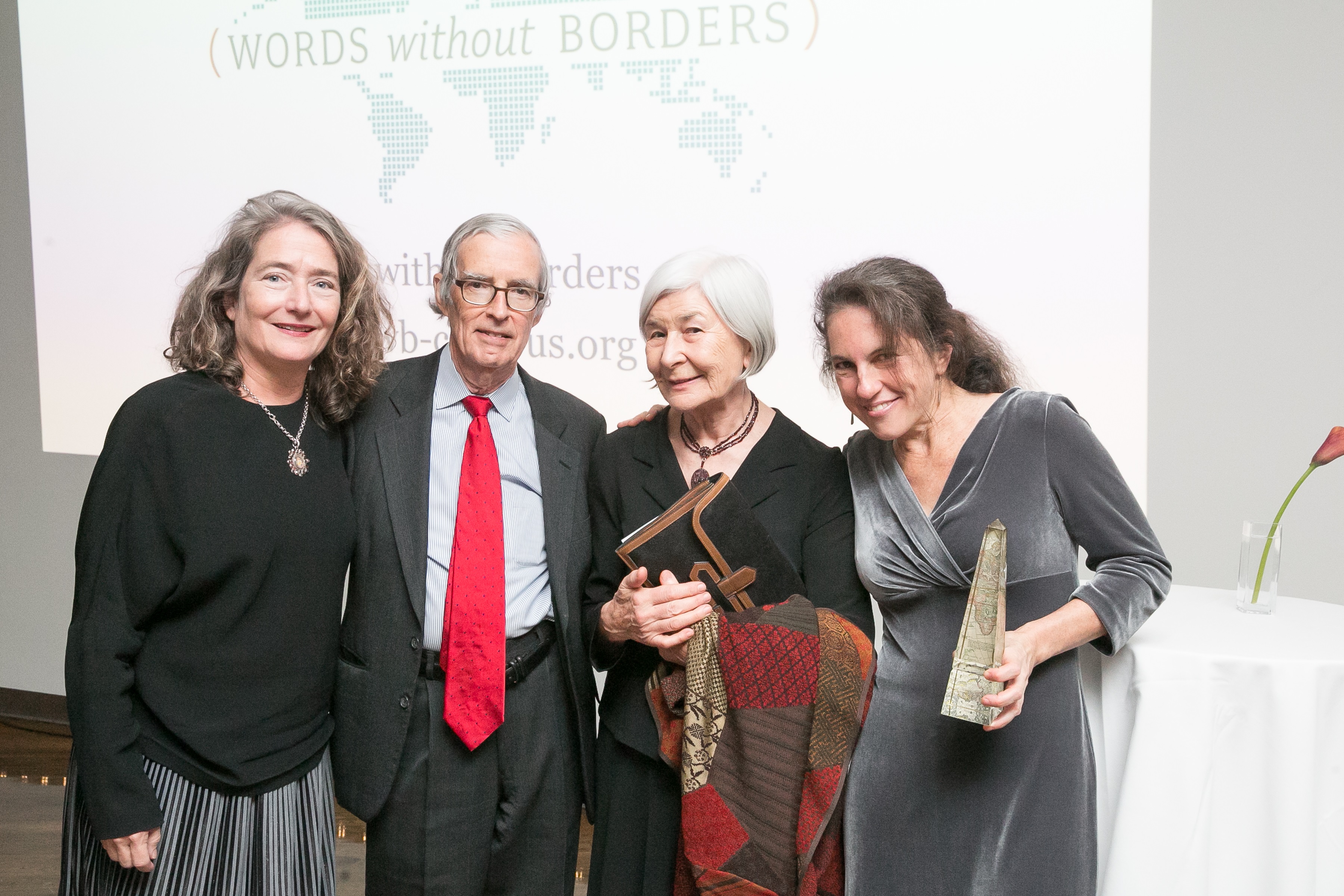The annual Words Without Borders gala celebrated the fifth anniversary of the Ottaway Award for the Promotion of International Literature on November 1, named for the first chair of the board, Jim Ottaway. This year, the award honored Jill Schoolman, publisher of Archipelago Books. Archipelago has been a stalwart of the small but dedicated cohort of advocates for international literature in the U.S. since Jill founded the house in 2003—the same year Words Without Borders was created. In her humble, sincere acceptance speech, she told the room full of publishers, writers, translators, educators, and philanthropists, “I’ve felt a special kinship with WWB from the beginning. We created ourselves around the same time for many of the same reasons… Books that Archipelago publishes allow us to lose ourselves in other cultures and explore other worlds. It is our extraordinary translators who guide us through those worlds. We are extremely lucky to be working with such talented translators who are able to make books come alive for us, in both language and spirit. This wonderful award also belongs to them, too.”
Dispatches
Jill Schoolman Honored at the Glamorous WWB Gala

Young people are being told that America comes first. I think we are here tonight because we believe otherwise and because we read otherwise.
Weekly Dispatches from the Frontlines of World Literature

Your news from the literary world, all in one place.
Here we are with this week’s news on exciting developments in the world of literature! Our Editor-At-Large for Singapore, Tse Hao Guang, updates us on new translation initiatives and experimental literary events. Sarah Moses, our Editor-At-Large for Argentina and Uruguay, fills us in on recent literary festivals and on an event honoring everyone’s favorite cartoon cynic. Finally, Tomás Cohen, our Editor-At-Large for Chile, tells us about some exciting new publications appearing in the region.
Tse Hao Guang, Editor-At-Large, with the latest updates from Singapore:
In the spirit of experimentation, stalwart independent bookstore Booksactually devised a Book Prescription Day (Sep 30) in conjunction with #BuySingLit, inviting the public to meet seven authors one-on-one as they administered literary balm to all manner of ailments. Literary nonprofit Sing Lit Station put on a zany, rave-reviewed, pro-wrestling-meets-spoken-word spectacle Sing Lit Body Slam (October 6-7), selling out on opening night. Sing Lit Station also announced the 2018 Hawker Prize for Southeast Asian Poetry, awarding the best poems published by SEA-affiliated journals to a combined tune of SGD$2500 (USD$1800). Finally, Singapore played host to the 2nd Asian Women Writers’ Festival (September 29-30), with Singaporean novelists Balli Kaur Jaswal and Nuraliah Norasid speaking alongside other writers from the UK, the Philippines, Pakistan, and India.
Weekly Dispatches from the Frontlines of World Literature

Music, art and linguistics have been knocking on literature's door around the world this week. Asymptote members bring you the scoop.
Literature is interdisciplinary by nature, and the world showed us how this week. From visual art exhibitions and a reading of the Universal Declaration of Human Rights in Hong Kong to a music festival infiltrated by writers in Slovakia and a commemoration of the late sociolinguist Jesús Tuson in Catalan, there is much to catch up on the literary world’s doings this week.
Hong Kong Editor-at-Large Charlie Ng Chak-Kwan brings us up to speed:
Themed “Fictional Happiness,” the third edition of Hong Kong Literary Season ran from June to late August. The annual event is organised by one of the most important Hong Kong literary organisations, the House of Hong Kong literature. This year the event featured an opening talk by Hong Kong novelist Dung Kai-cheung and Taiwanese writer Luo Yijun, a writing competition, an interdisciplinary visual arts exhibition, and a series of talks, workshops and film screenings. Five visual artists were invited to create installations inspired by five important works of Hong Kong fiction in response to the exhibition title, “Fictional Reality: Literature, Visual Arts, and the Remaking of Hong Kong History.”
Interdisciplinary collaboration has been a hot trend in the Hong Kong literary scene recently. Led and curated by visual artist Angela Su, Dark Fluid: a Science Fiction Experiment, is the latest collection of sci-fi short stories written by seven Hong Kong artists and writers. The book launch on September 2 took place at the base of Hong Kong arts organisation, “Things that Can Happen,” in Sham Shui Po. The experimental project was initiated as an artistic effort to reflect on recent social turmoils through scientific imagination and dystopian visions. The book launch also presented a dramatic audio adaptation of one of the stories, “Epidemic Investigation,” from the collection.
On September 6, PEN Hong Kong hosted a bilingual reading session (Cantonese and English) as part of the International Literature Festival Berlin (ILB) at Art and Culture Outreach (ACO) in Wan Chai. About twelve Hong Kong writers, journalists, and academics participated in “The Worldwide Reading of the Universal Declaration of Human Rights” by reading excerpts of their choice from works that deal with issues of human rights.
Amid the literary and artistic attention to Hong Kong social issues and history, local literary magazine, Fleur de Lettre, will take readers on a literary sketching day-trip in Ma On Shan on September 9. During the event named “August and On Shan,” participants will visit a former iron mine in Ma On Shan to imagine its industrial past through folk tales and historical relics. READ MORE…
Youmein Festival: Creating Art in the Liminal Space Between Tradition and Imitation

“Is a society made up of endless imitations that become canonized as tradition? Or do traditions change through borrowing from other cultures?"
Diverse languages and artistic disciplines intersected at the Youmein Festival in Tangier where artists and writers from Morocco, Algeria, Spain, and France created pieces to reflect the interplay between tradition(s), taqalid, تقاليد, and imitation, taqlid, تقليد.. Asymptote’s Tunisia Editor-at-Large Jessie Stoolman and writer Alexander Jusdanis report from Tangier.
For the past three years, Youmein (“Two Days” in Arabic) has brought together diverse artists in the city of Tangier to create art installations based on a central theme over a 48-hour period.
The festival is run by Zakaria Alilech, a translator and cultural events coordinator at the American Language Center (ALC) Tangier, George Bajalia, a Ph.D. candidate in anthropology at Columbia University, and Tom Casserly, a production manager at Barbara Whitman Productions. They’re quick to emphasize their hands-off approach. “We’re not curators,” says Alilech. Instead, they see themselves as facilitators, providing artists the initial inspiration, space and support to realize their ideas. The trio stressed that Youmein is less about the final product and more about the process of making art.
They intend the festival to be an opportunity for the artists and audience to discover Tangier through the lens of each year’s theme. While strolling through the city’s streets, historically a meeting point for peoples from around the Mediterranean and beyond, it is not uncommon to hear any combination of Rifiya, Darija, Spanish, French, English, and Italian. Thus, it is perhaps unsurprising that language has played an essential role in selecting the theme of the Youmein festival from its inception.
Weekly Dispatches from the Frontlines of World Literature

Probably the best source of global literary news available.
It’s the official start of Autumn in the Northern Hemisphere and Spring in the South―the beginning of a new season where minor plans and promises are made that we desperately try to be faithful to. Or maybe not. Maybe it’s just the temperature that changes. Nonetheless, here at Asymptote we’ll always fulfill our promise of bringing you the latest news from around the globe, just in time for the weekend, with this week’s reports from Argentina, Romania and Moldova, and Taiwan.
Lara Norgaard, Editor-at-Large, brings us the news from Argentina:
August in Argentina was a month for reading. Buenos Aires celebrated Jorge Luis Borges’ birthday on August 24 by organizing a walking tour tracing Borges’ most notable haunts. The 24th is also the country’s annual Día del Lector, commemorating the renowned writer.
On August 23, the Latin American Art Museum of Buenos Aires (MALBA) hosted a conversation between North American policy analyst David Rieff, and Argentine novelist Luisa Valenzuela on the topic of collective memory. Valenzuela is known for her novels that recall state violence, written during and after Argentina’s brutal last military dictatorship. The topic of historical memory is especially relevant right now as the Argentine public protests the alleged disappearance of indigenous rights activist Santiago Maldonado, who went missing at a protest in Patagonia on August 1.
Weekly Dispatches from the Frontlines of World Literature

You can't end the week without being up to date with the latest in the world of literature!
Need another reason to welcome the weekend? We heard you! We’ve got literary scoop from three continents—literary prizes, festivals, and much besides to help you travel the world through books (is there really a better way?)
From Singapore comes a dispatch from Editor-at-Large, Theophilus Kwek:
Celebrations were in order last month as graphic novelist Sonny Liew became the first Singaporean to win—not one, but three—Eisner Awards for The Art of Charlie Chan Hock Chye, originally published by Epigram in 2015 and later released in the US by Pantheon. The volume, which narrates an alternative political history of Singapore through the life and work of a fictional Singaporean artist, also received the most nominations in this year’s awards, which were presented at Comic-Con International in San Diego on July 22. The National Arts Council (NAC), which had previously drawn criticism for withdrawing Liew’s publishing grant on the grounds of ‘sensitive content’, came under fire once again for its brief (and some argued, half-hearted) congratulatory remarks on Facebook which did not mention the title of the winning work. Liew’s forthcoming projects include a take on the story of Singapore WWII heroine Elizabeth Choy.
Just a week after Liew’s win, Singapore’s Minister for Culture, Community and Youth, Grace Fu, responded to a parliamentary question over another NAC grant decision, this time concerning a novel by Asymptote contributor Jeremy Tiang, State of Emergency—also published by Epigram this year. According to Fu, funding was withdrawn from Tiang’s novel, which traces the lives of several fictional political activists and detainees, because its content had “deviated from the original proposal”—a statement which immediately drew mixed responses from Singapore’s literary community. At around the same time, fellow novelist Rachel Heng joined the ranks of Singaporean authors gaining recognition abroad as her forthcoming dystopian title, Suicide Club, was picked up by both Hodder & Stoughton in the UK and Henry Holt & Co. in the US.
Finally, on the eve of National Day (August 9) just this week, twenty-four writers and poets from Singapore presented a marathon 4-hour reading at BooksActually, which also runs an independent publishing arm, Math Paper Press. In addition to the literary delights on offer, the bookstore also served up another spicy and flavourful local favourite—fried chicken wings.
When There’s No Wind, the Sounds of the Past are Audible Over the Danube

On opposite banks of the Danube in Hungary and Slovakia, separated peoples find a way to talk in many languages across the ancient river.
Today we profile a unique literary gathering, AquaPhone Festival, that takes place on both banks of the Danube. It not only features literature from Hungary and Slovakia but also acts as a cultural bridge between the nations that have been isolated from each other’s shared histories by totalitarian rule. It serves as a powerful symbol against the rising tide of xenophobia, as a conversation with Karol Frühauf reveals.
it could be done by us just shouting
just talking to each other over the water
and not by me going over to you by boat
you going angling? I’d shout into the wind
and your voice would echo across the water
no! I’m going angling! oh, right! I’d shout
all right I thought you’re going angling
— From ‘Modalities of Crossing’ by Dániel Varró, translated from the Hungarian by Peter Sherwood
From the southwestern part of the Danubian Hills, poetry drifts above the waves of the Danube. Lines of verse bounce from one side of the river to the other, hard on each other’s tails yet in accord, dissolving in the air.
lehetne az is hogy csak kiabálunk
hogy csak beszélgetünk a víz fölött
és nem megyek át hozzád ladikon
horgászni mész? kiáltanám a szélbe
és hangod visszaringna a vizen
nem! horgászni megyek! ja! kiabálnám
ja jól van azt hittem horgászni mész!
— From ‘az átkelés módozatai’ by Dániel Varró
Someone is reciting poetry. It takes a while for the words, carried by sound waves, to cross the river. This is how poetry behaves when a poem is recited aloud above a river. The author of this year’s poem, “Modalities of Crossing,” is the wonderful Hungarian poet and children’s writer, Dániel Varró.
dá sa aj tak že si len zakričíme
len si nad vodou pohovoríme
a neprejdem za tebou cez lávku
ideš na rybačku? volal by som do vetra
a tvoj hlas by sa na vode prihojdal
nie! idem na rybačku! aha! volal by som
aha dobre myslel som že na rybačku!
— From ‘možnosti prepravy’ by Dániel Varró, translated from the Hungarian into Slovak by Eva Andrejčáková
Varró’s poem is read out in several languages: first in Hungarian (the poet’s native tongue), then in Slovak, and finally in German. You have to wait patiently for the lines to reach you from the far shore before you can send your version back by the same route. The extraordinary dialogue is accompanied by live cello, saxophone, and clarinet. There is no wind, the June sunshine is reflected in the water, bathing the majestic domes of the basilica in the distance in its soft light. This is what the AquaPhone festival is like.
Weekly Dispatches from the Frontlines of World Literature

The international literary news you won't find anywhere else.
It’s Friday and we’re back with the latest news from our Editors-at-Large, providing us with their personal roundups of the most exciting literary developments in their region. We kick off with Jessie Stoolman in Morocco, where there’s never a shortage of intriguing events and publications; Julia Sherwood in Slovakia takes us on a tour of the various cross-cultural literary encounters that have been occurring recently in the Czech Republic; and finally, Omar El Adl gives us some insight into the latest talks, discussions and publications that are taking place right now in Egypt.
Jessie Stoolman, Editor-at-Large, reporting from Morocco:
July was filled with literary events throughout Morocco, starting with a conversation between two Moroccan Prix Concourt winners, Leila Slimani and Tahar Ben Jelloun, at the Minzah Hotel, where they discussed “Comment écrire et publier un livre?” (“How to write and publish a book”) Another star Moroccan author (and painter), Mahi Benibine, whose novel Horses of God, inspired by the 2003 suicide attacks in Casablanca, was made into a critically-acclaimed film, presented his newest novel Le fou du roi at Librairie les insolites in Tangier.
Speaking of new publications from major Moroccan authors, Dar Toubkal’s newly released publication of the poet Mohammed Bennis’ الأعمال النثرية (Works of Prose) was just reviewed in Al-Hayat.
Still staying within the Tangier region, the Galerie Delacoix hosted artists, academics, and students for the الجسد الإجتماعي والمحيط الحضري (Espace urbain & corps social) program and internal working week. Among the participants was Moroccan-French artist and co-founder of the Cinémathèque du Tanger, Yto Berrada. Given continued action from the Al-Hoceima-based protest movement (حراك الريف), the geographer William Kurtz’s talk on “La Globalisation de la Région Tangier Al-Hoceima et son impact sur les inégalites sociales et spatiales” (“Globalization of the Tangier Al-Hoceima Region and its impact on social and spatial inequalities”) was particularly timely.
If that was not enough activity in Tangier, Librairie des Colonnes hosted Zahra Al-Khamleshi, who presented her most recent work, الحدود في شمال المغرب: آمال وآلام النساء الحمالات (Borders in Northern Morocco: Hope and Suffering of Women Porters) on the women who carry products between Ceuta (a Spanish enclave/colony in northern Morocco) and Morocco.
Moving further south, in Casablanca, Kabareh Cheikhats was back again. Their travelling show aims to shed light on the history of Cheikhats, who are often mischaracterized as exotic dancers. Historically, Cheikhats throughout the Maghreb were skilled poets, improvising verses on such controversial topics as resistance to colonization, which they sang and set to music at community gatherings.
Lastly, check out the “Lilipad” project, started by young Moroccan activist Sara Arsalane, which aims to collect books and distribute them to underserved schools throughout Morocco.
Julia Sherwood, Editor-at-Large, with all the latest news from the Czech Republic:
On August 4, as we go to press, Czech poet and literary historian Petr Hruška and Georgian poet and musician Erekle Deisadze are reading from their works in the Ukrainian city of Lviv. Their performance brings to a close a 31-day long marathon tour of five cities, comprising Authors’ Reading Month (Měsíc autorského čtení or MAČ 2017), Central Europe’s largest literary festival. The readings, by two or more authors each day, are broadcast live and the recordings are available online. The festival’s founder Petr Minařík, whose publishing house Větrné mlýny is based in the Czech Republic’s second largest city Brno, has given a wide berth to capital cities, instead locating the festival in four other cities of similar size: Ostrava near the Polish border, Wrocław on the other side of the border in Poland, Košice in eastern Slovakia and, more recently, Lviv in Ukraine.
The guest country of this year’s festival, which kicked off in Brno on 1st July, is Georgia. This country in the Caucasus is fast becoming a trendy tourist destination, yet its literary riches are not all that well known in Central Europe. Thirty-one Georgian writers joined the tour, accompanied by acclaimed Czech authors, among them Ivan Klíma, Arnošt Goldflam, Ivan Binar, Marek Šindelka, Martin Reiner, Michal Viewegh and Jáchym Topol (whose 1995 novel Angel Station, just out from Dalkey Archive Press in Alex Zucker’s English translation, was reviewed by James Hopkin in last week’s Times Literary Supplement). A traditionally strong Slovak contingent was represented by poets Peter Repka and Ivan Štrpka, and fiction writers Balla, Monika Kompaníková, Ondrej Štefánik, Michal Havran, and Silvester Lavrík. Several Ukrainian and Polish writers and poets also took part in some of the readings.
One of the Polish festival participants, Zośka Papużanka, arrived in Brno fresh from another appearance, in Prague, with Czech writer Ivana Myšková. The two women read from their works at the (A)VOID Floating Gallery, a boat moored on the Vltava Riverbank, which serves as an art gallery and a venue for music, theatre and literary readings. Other writers reading there this summer include Ben Aaronovitch and Czech horror story writer Miloš Urban. The gallery provided a more than fitting venue for the launch of a bilingual Czech and English anthology, A Giant Barrel of Rotgut, that “celebrates the Vltava as a river of slain crocodiles, viziers and rotgut.” If that sounds intriguing, you can find out more in this interview with poet Sylva Fischerová on Radio Prague.
And, finally, emerging translators from the Czech (and Slovak) will be interested to hear that Underpass.co, an online journal for modern literature in translation, is seeking submissions specifically from these two languages. The journal aims to offer English-speaking readers a window into new countries, neighbourhoods, cultures, perspectives, and they are especially interested in stories with a strong sense of place.
Omar El Adl, Editor-at-Large, giving us the latest scoop from Egypt:
Alia Mossallam presented a talk on August 3 in the Townhouse gallery in Downtown Cairo. The talk featured her text RAWI which deals with motherhood, writing, and revolutionary politics, according to Mada Masr. Mossallam has collected oral history testimonies in Nubia, Alexandria and Port Said, has been involved in alternative pedagogical structures in Cairo, and her dissertation focused on a popular history of Nasserist Egypt through stories and songs by people behind the 1952 revolution. The text was created as part of a long form essay workshop held in Cairo by 60pages, which describes itself as an international network of writers, artists, thinkers and scientists, based in Berlin. Other texts produced for 60pages include Arab Porn by Youssef Rakha (which will be published as a book featuring Rakha’s photography by Matthes and Seitz Berlin), Migrating the Feminine by Nora Amin and a forthcoming text by Amr Ezzat. The talk was held in Arabic, with a reading of the text in English.
Youssef Rakha is also to write a column as the central character from his Book of the Sultan’s Seal, Mustafa Çorbacı, according to his bimonthly newsletter. Rakha describes this development on his newsletter as follows:
“First, that mad newspaperman Mustafa Çorbacı has resolved to write a column. You may be familiar with Çorbacı from a certain, overrated Book of the Sultan’s Seal. In hopeless pursuit of the same meme, he has named his ephemeral effusions, “Postmuslim.” Raising vaguely relevant questions only to leave them grossly un-dealt with would not be untypical. But if mildly psychotic speculation on being in Cairo today holds some promise of amusement, do humour the unfortunate lunatic by reading and sharing his 400 words.”
According to Rakha, the column will appear printed in Al-Ahram Weekly as well as on this site every Friday starting from July 7.
****
Read More News:

